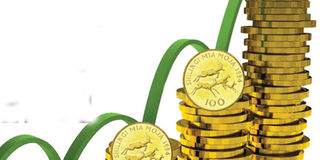Experts predict bright prospects for the Shilling in 2020

Dar es Salaam. The Tanzanian shilling is likely to perform better in 2020 as economic experts and central bank officials expect the national currency to sustain the stability it had throughout last year.
The local currency - which experienced much volatility in the beginning of 2019, reaching close to Sh2,400 per dollar at the bureaux de change - is now exchanging at below Sh2,300, and has stabilised since last March.
The shilling is ranked among top ten of Africa’s most stable currencies, having depreciated by just 0.01 percent in 2019,. This is according to figures tracked by Bloomberg Terminal.
The Egyptian pound leads the currencies, followed by the South African rand - both having gained by 11.8 and 2.82 percent respectively.
Economic experts see a “brighter future” for the Tanzanian currency, as they expect “no big surprises that may create shocks” to the shilling this year.
“I think the government interventions contributed to the stabilization, while the country is also experiencing reasonable balance of payments,” said Prof Delphin Rwegasira of the University of Dar es Salaam economics department.
Performance of the shilling is basically influenced by factors of demand and supply in the financial markets, even as the central bank buys or sells the dollar to regulate demand and supply so that market forces do not affect. For example, BoT purchased $196.8 million in the third-quarter of 2019 to regulate demand and supply - thus stabilize the shlling.
Towards the end of last year, BoT also closed over 50 forex bureaus, citing tax evasion and money laundering as the reasons.
President John Magufuli was also quoted as saying that the government intervened after realising that some bureaux operators had up to seven unregistered shops using one licence. This created room for tax evasion. Also, the money exchanged through some forex bureaus wasn’t reflected in Tanzania Revenue Authority’s records.
“I think the rationalisation of money which shifted the forex flow through the commercial banks is an important factor which removed speculative element in the financial markets,” said Prof Rwegasira.
Future performance
Supply of the dollar in Tanzania is also affected by external factors as well. including export and import volumes; US and Eurozone economies (which are now characterised by low interest rates); and oil price fluctuations.
“I don’t see any of those factors affecting us in 2020,” said the central bank’s director of Economic Research and Policy, Dr Suleiman Misango.
“Exports are improving, and there’s substitution of some imports like tiles which are locally produced - thus reducing pressure on dollar demand,” he said.
“We do not expect a steep increase in oil prices; the latest rise was fueled by US-Iran tension - and is just temporary. The US is also holding elections this year and Eurozone countries are still struggling. Hence, there should not be much flow of capital to those countries,” he reasoned.
As 2020 is also an election year in Tanzania, economists play it down - with some saying “anything may happen”.
“Let’s wait and see,” said Prof Honest Ngowi of Mzumbe University.
“The Tanzanian currency has been so volatile that it could not be determined by imports and exports alone. It would also depend on markets reactions and investor perception as we approach the general elections,” Prof Ngowi elucidated further.
However, in the considered view of Prof Rwegasira, there is “nothing surprising” - and which may influence a fall in value of the national currency.
“I see it being reasonably stable in 2020 because there are no major shocking events. With the general elections on the horizon, we are likely to have electoral candidates who are already well know n regarding their policies - and, therefore, there is no cause for shock at all,” Prof Rwgasira stated.
On the part of Dr Misango, he said the general elections at the end of 2020 are not much linked with the main factors which usually impact currency exchange rates - factors he said are mostly external.
“After all, Tanzania is known for its political stability - especially during elections. It should not worry investors or tourists,” Dr Misango said.
The value of goods and services exports grew by 11.9 percent to $9.53 billion in the year ending November 2019, driven by service receipts and non-traditional goods exports.
In the same period, Tanzania’s gold which accounted for 51.4 percent of non-traditional exports increased by 41.9 per cent to $2.14 billion, the highest in the last seven years as the government associated the gains to its tight control of the mining sector.




